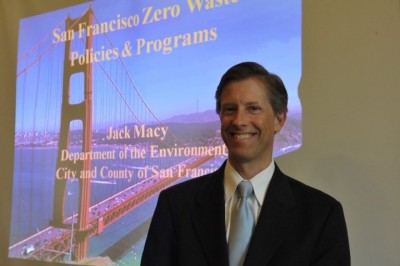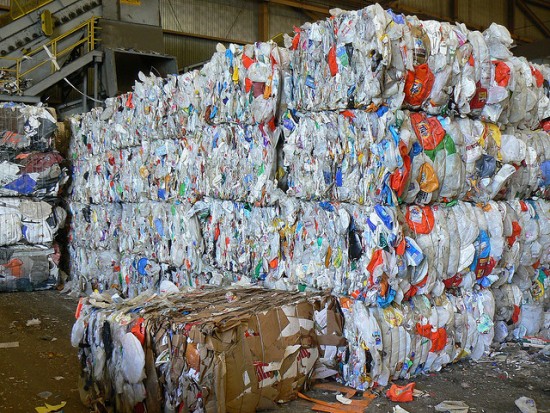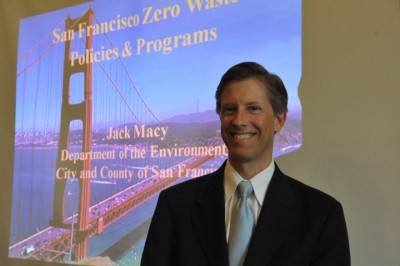 If you want to keep garbage out of landfills, you have to stop thinking about it as garbage. Instead, think of it as resources. If you’re throwing away the part of that veggie burger you couldn’t finish, you’re throwing away potential compost for the vineyard that’s growing grapes for the bottle of wine you’ll drink with your next meal.
If you want to keep garbage out of landfills, you have to stop thinking about it as garbage. Instead, think of it as resources. If you’re throwing away the part of that veggie burger you couldn’t finish, you’re throwing away potential compost for the vineyard that’s growing grapes for the bottle of wine you’ll drink with your next meal.
This is how Jack Macy thinks. He developed San Francisco’s trailblazing composting program and is currently Zero Waste Coordinator for the city. Here, he shares the city’s secrets to success.
Q. What makes San Francisco’s waste management unique?
A. We have policies to push us all the way toward a future of sending zero waste to landfill. Those general policies came out of developing programs to divert as much material that can be recycled or composted as possible. In addition to comprehensive recycling, we also have a composting collection program that includes not just yard trimmings and plant debris, which is common in California, but all food scraps and other food-soiled paper products that would not otherwise be recyclable.
Q. How has San Francisco’s waste management changed over the last decade?
A. We were the first ones to do large-scale food composting in the state, starting on the commercial side in ‘96 and on the residential side in ‘97. We started citywide in ‘99, and by 2000 we’d established the framework that we have now and it’s been expanding as we seek to get everyone involved.
Following our lead, a lot of jurisdictions have taken our guidelines. California and the West Coast [are] doing more with this comprehensive approach. And that results in a lot of material being diverted.
If you look at what we accept as recyclable and compostable, it adds up to 90 percent of everything that’s being discarded. If everybody recycled or composted what they could, we’d be at 90 percent. We recognize that we’re not going to get everybody to do it.
Q. Who led the change?
A. It really came out of our department. We were looking at the larger picture of why recycle and compost, and there’s so much more than just saving landfill space, it’s about conserving resources. In our case, our department, we were the activists promoting it. We’ve had the political support to push the envelope — both the mayor and the [board of supervisors] and visionary people in our department have helped us do that.
We adopted our goal back in 2002 — eight years ago — and we weren’t the first, but we were the first in the state to set a date on zero waste.
We have a commission on the environment appointed by the mayor, and we often work through the commission on developing policies. So we were doing that with the zero waste thing and bringing in different local organizations.
[Randy Hayes] said we had to pick a date, and we’re like, well we don’t know when we can get there. And he said let’s do it in 2020 and we said okay.
When the zero waste policy went to the board of supervisors, they adopted the 75 percent and they decided not to pick a date for zero waste. They kicked it back to the commission on the environment and said once the city certifies that it’s met 50 percent then you can pick a date for zero waste.
Q. How did you overcome skepticism and gain buy-in?
A. We weren’t saying we’re going to tax businesses or raise your rates — it was just saying, “we want to recycle and compost as much as possible.” Why would people be against that? We weren’t saying what a specific impact would be, and that’s something that had to be figured out as we go along.
The mandatory [composting] was a much bigger deal to pass, because that was a direct behavioral thing we were asking people to do. We went through a long stakeholder process, meeting with apartment associations, business associations, building manager associations, the chamber, to get their impact and support on how mandatory would work.
There are a lot of laws that ask people to do things and there’s a lot of common sense behind this too. People have been recycling for a long time, we’ve had the compositing program for a decade, but not everyone was participating.
Q. Were there new costs associated with the new system?
A. We’ve created a rate structure so that when people compost and recycle more, it’s easy to save money. If you reduce your trash service, which is very easy on the commercial side, you’ll save. The average small business that goes from not recycling and composting to recycling and composting, it’ll save hundreds of dollars a month. And a large business will save thousands.
From helping them to physically set up a program and providing stickers and signs and doing training of janitors, we have a whole team of people who do this training. We provide all the assistance you need to help make this program easy to implement. There are thousands of businesses that are participating.
Our goal is not to come out and start beating people with a stick and start fining people. We want to use this as a tool to help educate people that they need to be participating, get their attention, and we’re doing outreach and assisting people in participating and benefiting financially.
Q. Has it been successful?
A. The impact has been tremendous. From the time that mandatory composting was passed in April last year, we’ve gone from 400 tons a day of compostables being collected to almost 600 tons. Within a year we saw an increase of about a quarter in the number of businesses participating.
We have a restaurant next door and he has a resistance to government telling him to do something, and he had this mind-frame that it was too hard to do and we kept working with him and finally got him on the program, and they’re like, oh my God, we’re saving so much money and it’s so easy.
Hopefully we’ll see the program continuing to expand. Alameda County, Contra Costa County, and now San Mateo County are rolling out programs. So there’s more and more food scraps. And in addition to composting, we’ve been doing digestion of food scraps. We’re looking at different technologies to digest all our stuff first and then compost that.
[Composting is aerobic — in other words, it uses oxygen. Digesting food scraps is anaerobic. It’s more expensive, but it produces useful methane gas.]
Local governments are responsible for managing these material streams. Often we’ll have a contract with a private hauler. We’re a little different in that we have a permanent hauler system going back to 1932. We have an exclusive hauler and we regulate that hauler like a utility. The city helps set the rates that the collectors charge residents and businesses and it’s those rates that fund the whole system.
Residents only pay the volume of the container that’s being collected for landfilling, and whatever they put in blue or green, they’re not paying extra for that.



